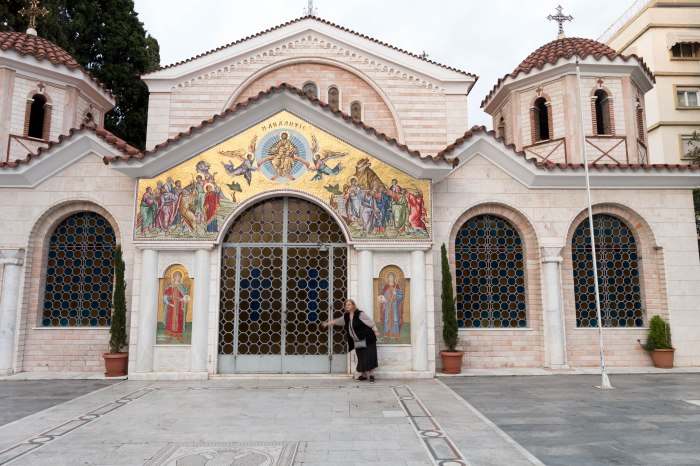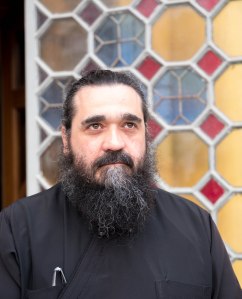
Exterior of the Ascension of Christ Orthodox church in the Depo neighborhood of Thessaloniki.
Photo by Sydne Mass
Story by Paxtyn Merten ·
THESSALONIKI, Greece – It’s a Sunday morning at the towering New Osia Xeni Church and people are meandering in and out of arched entryways into a circular rotunda where hundreds are settled in rows of wooden chairs, observing a service that includes traditional Greek Orthodox chanting and the sort of sermon that helps lift a population troubled by what is known here as “The Crisis.”
Estrella Samarina is standing on the front porch taking a cigarette break from the Mass. She is chatting with Athanasia Chalkia, whom she has never met despite the fact they live a block apart in Harilaou, a middle-class neighborhood where the church is located. Chalkia rarely attends and only came on this day to attend a memorial service. But Samarina has been attending every week over the past three years in an effort to cope with problems in her life.
“Church is the only place I find help. For everything. It calms your soul,” Samarina said through a translator. “It’s not that I didn’t go to church before, but I had a personal hardship and now I’m here.”
Her story serves as a familiar backdrop to a narrative that has spun itself into the lives of many Greeks who are suffering from an economic crisis that first hit in 2008. Ninety percent of Greeks identify as Orthodox Christian, so not surprisingly, the church has played a major role in how people have dealt with the crisis’ impact on their lives.
For some, the church has functioned as a refuge to find hope and stability. For others, churches have increasingly served a more practical role: as places to go for food and financial support.
“People want to go to the church more often because they have problems in their lives,” said Constantinos Zafeiriadas, a service provider at Ypapanti Church in downtown Thessaloniki. He said many of these problems stem from the economic crisis because “the economy affects everything else.”
For almost a decade, Greek residents have faced massive tax increases intended to raise funds to pay off the nation’s debt. At the same time, most employers have slashed salaries, sometimes by more than 50 percent. With an unemployment high of 27.9 percent in September 2013, the country now sits at 23.2 percent unemployment, according to the Hellenic Statistical Authority. Multiple bailouts forced the government to raise taxes and cut pensions and government spending to decrease its debt. The resulting stress of these realities has put pressure on the livelihood and mental health of the nation’s citizens, leading some to seek help through the church.
“As years go by and people get more and more distressed and they don’t see hope that something is going to change, they are looking for that which will give them hope and solutions to problems in the country,” said Konstandinos Arseniou, 20, through a translator. “Slowly, more and more people are turning to God.”
Arseniou also lives in the Harilaou neighborhood, which is located on the east side of Thessaloniki, the country’s second largest city. He is studying to become an electrical engineer, though his age puts him at a particular disadvantage within the national job market: People ages 15 to 24 currently suffer an unemployment rate of nearly 48 percent in Greece.
American College of Thessaloniki psychologist Maria Psoinos said many people she counsels connect their negative mental health symptoms with Greece’s economic crisis. Psoinos, who also conducts research on the psychological impacts of major adversities, including socioeconomic crises and migration, said these symptoms include stress, severe anxiety, depression, insomnia and hopelessness.

Father Peter Paschalidis, who has worked at the Ascension of Christ Orthodox church for 16 years.
Photo by Sydne Mass
Psoinos said people struggling with mental health issues as a result of the economy can get help from community-based centers throughout Thessaloniki, such as the Association for the Social Support of Youth, a non-governmental organization that provides social support to disadvantaged young people. Orthodox churches, she said, can also be considered examples of these community support centers.
“There are lots and lots of studies in the past decade that show that individually, prayer and having this structure in your daily routine of going to church or volunteering … psychologically helps because it gives a sense of control to people and it gives meaning to their lives,” she said.
The increase of people looking for spiritual support in this time of need has been especially evident at the Ascension of Christ Orthodox, a smaller-scale church in the middle-class Depo neighborhood in east Thessaloniki. Father Peter Paschalidis, who has served there for 16 years, said he sees his parishioners trying to reconnect with their faith.
“People are coming and try to discover their faith and reach inside themselves because they know the situation in the world is very terrible,” he said. “So they want to find the road to heaven and learn the truth about religion, about faith, about the other life after death.”
Churches also work to provide impoverished people with food, clothing and money to pay electricity and utility bills, the need for which has increased during the economic crisis. Paschalidis said that when his parish began distributing prepared food to the poor in 2005, volunteers would serve 40 to 50 portions per day. However, since the crisis hit three years later, he said that has increased to 100 to 120 portions, depending on the day. Furthermore, he said people’s greatest request of the church has been for money to help them pay off bills, loans and medical treatments.

Sofia Spirydopoulou (right) and a fellow volunteer preparing food in the Panagia Dexia church’s community center.
Photo by Sydne Mass
Sofia Spirydopoulou, a volunteer chef at a soup kitchen sponsored by the massive Panagia Dexia church in downtown Thessaloniki, said even people who are not severely impacted by the crisis are going back to the church to help those who are. Spirydopoulou said after seeing people endure major hardships, such as digging in the trash for more food, those who can afford to are providing more donations and money.
“The crisis has made them more sensitive to the situation of others,” she said through a translator. “They are helping more because they see people are suffering. They used to be in their own small world but now they are seeing the people suffering and are coming to help.”
Spirydopoulou’s soup kitchen is located a block from the church and a five-minute walk from the famous Rotunda of Galerius. There is a glass door that opens directly into the kitchen of the small, graffiti-covered building which serves as the church’s community center. Spirydopoulou and a few other volunteers begin preparing food at 9 or 10 a.m. to serve at noon every day other than Sunday. Her food supply is supplemented through donations from people, stores, bakeries and butcher shop leftovers, as well as money from church offerings.
Zafeiriadas and other local church officials also said donations have increased within their parishes, although so has the need. There is not always enough food and money to support everyone who seeks help. At Paschalidis’ church and others, parishioners regularly bring in cooked food to be shared among those who need it, and some private local mini markets and “social” grocery stores – markets which are only open to those in poverty – offer bulk amounts of food so the church can provide meals for months.
Between psychological and monetary assistance, parishioners and priests said the church serves primarily as a beacon of hope during this time of crisis. Father Iakovos Vassiliou, a priest at Neoj Marmaias church in Halkidiki, a multi-peninsula region of Greece located southeast of Thessaloniki, said people fall back on religion because God is their last hope.
“Maybe the church is the only hope that they have in this time at this period,” Vassiliou said. “They believe God, they trust God and they hope in God.”



It’s pretty sad when humans have to rely on “an afterlife” to help them through this one….
LikeLiked by 1 person
Great story Paxtyn. Sometimes, faith is the only thing that helps. Faith, hope and love.
LikeLiked by 1 person
Pingback: Finally published! – Paxtyn Merten, reporting from Greece
Nice work Paxtyn. I love the “road to heaven” quote.
LikeLiked by 1 person